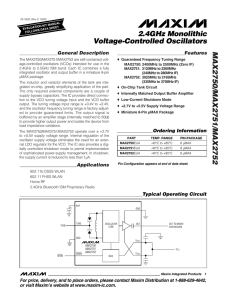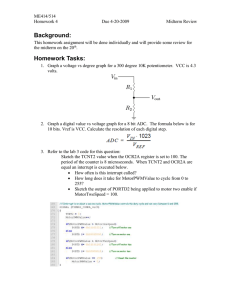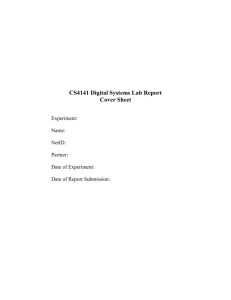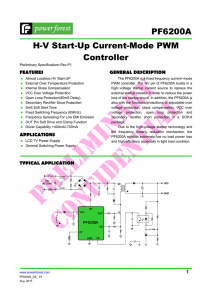MAX2622-24
advertisement
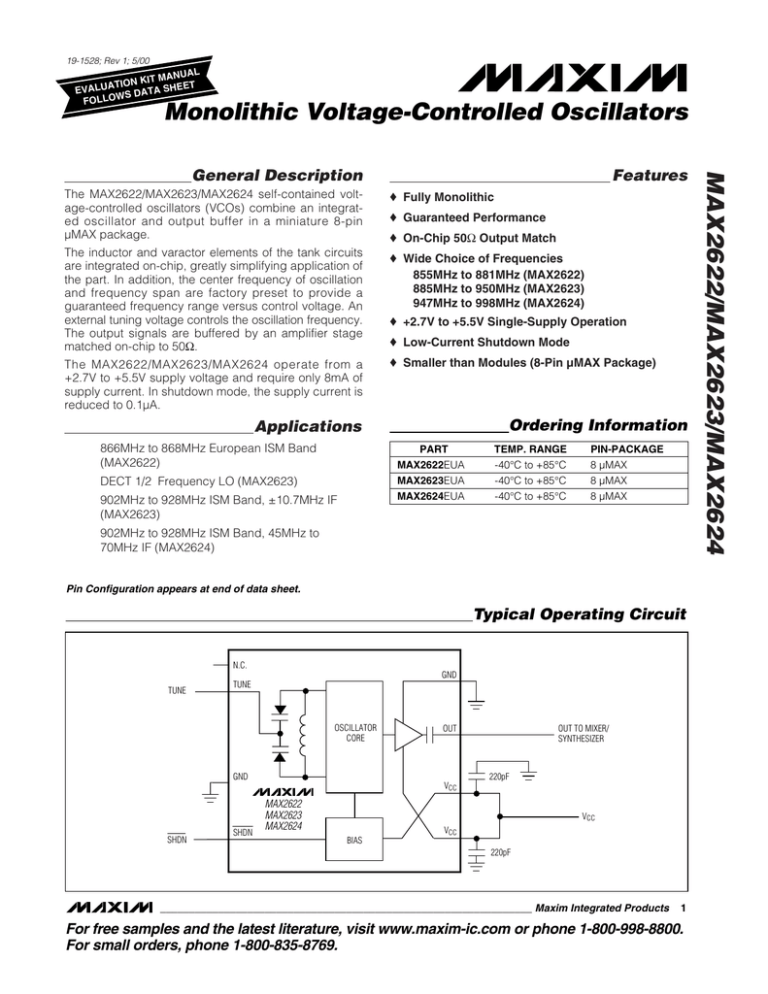
19-1528; Rev 1; 5/00 NUAL KIT MA ATION EET H S A EVALU T WS DA FOLLO Monolithic Voltage-Controlled Oscillators Features ♦ Fully Monolithic ♦ Guaranteed Performance ♦ On-Chip 50Ω Output Match ♦ Wide Choice of Frequencies 855MHz to 881MHz (MAX2622) 885MHz to 950MHz (MAX2623) 947MHz to 998MHz (MAX2624) ♦ +2.7V to +5.5V Single-Supply Operation ♦ Low-Current Shutdown Mode ♦ Smaller than Modules (8-Pin µMAX Package) Ordering Information Applications 866MHz to 868MHz European ISM Band (MAX2622) DECT 1/2 Frequency LO (MAX2623) 902MHz to 928MHz ISM Band, ±10.7MHz IF (MAX2623) PART TEMP. RANGE PIN-PACKAGE MAX2622EUA -40°C to +85°C 8 µMAX MAX2623EUA MAX2624EUA -40°C to +85°C -40°C to +85°C 8 µMAX 8 µMAX 902MHz to 928MHz ISM Band, 45MHz to 70MHz IF (MAX2624) Pin Configuration appears at end of data sheet. Typical Operating Circuit N.C. GND TUNE TUNE OSCILLATOR CORE OUT TO MIXER/ SYNTHESIZER OUT GND 220pF VCC SHDN SHDN MAX2622 MAX2623 MAX2624 VCC VCC BIAS 220pF ________________________________________________________________ Maxim Integrated Products 1 For free samples and the latest literature, visit www.maxim-ic.com or phone 1-800-998-8800. For small orders, phone 1-800-835-8769. MAX2622/MAX2623/MAX2624 General Description The MAX2622/MAX2623/MAX2624 self-contained voltage-controlled oscillators (VCOs) combine an integrated oscillator and output buffer in a miniature 8-pin µMAX package. The inductor and varactor elements of the tank circuits are integrated on-chip, greatly simplifying application of the part. In addition, the center frequency of oscillation and frequency span are factory preset to provide a guaranteed frequency range versus control voltage. An external tuning voltage controls the oscillation frequency. The output signals are buffered by an amplifier stage matched on-chip to 50Ω. The MAX2622/MAX2623/MAX2624 operate from a +2.7V to +5.5V supply voltage and require only 8mA of supply current. In shutdown mode, the supply current is reduced to 0.1µA. MAX2622/MAX2623/MAX2624 Monolithic Voltage-Controlled Oscillators ABSOLUTE MAXIMUM RATINGS VCC to GND ..............................................................-0.3V to +6V TUNE, SHDN to GND .................................-0.3V to (VCC + 0.3V) OUT to GND ...............................................-0.3V to (VCC + 0.6V) Continuous Power Dissipation (TA = +70°C) 8-Pin µMAX (derate 5.7mW/°C above TA = +70°C).....457mW Operating Temperature Range ...........................-40°C to +85°C Junction Temperature ......................................................+150°C Storage Temperature Range .............................-65°C to +150°C Lead Temperature (soldering, 10s) .................................+300°C Stresses beyond those listed under “Absolute Maximum Ratings” may cause permanent damage to the device. These are stress ratings only, and functional operation of the device at these or any other conditions beyond those indicated in the operational sections of the specifications is not implied. Exposure to absolute maximum rating conditions for extended periods may affect device reliability. DC ELECTRICAL CHARACTERISTICS (Typical Operating Circuit, VCC = +2.7V to +5.5V, VTUNE = 1.4V, V SHDN = 2V, OUT = unconnected, TA = -40°C to +85°C, unless otherwise noted. Typical values are at VCC = +3V, TA = +25°C.) (Note 1) PARAMETER CONDITIONS MIN Supply Current Shutdown Supply Current TYP MAX UNITS 5.5 V 8 11.5 mA 0.1 5 µA 0.6 V 2.7 Supply Voltage V SHDN ≤ 0.6V SHDN Input Voltage Low SHDN Input Voltage High 2.0 V SHDN Input Current Low V SHDN ≤ 0.6V -0.5 0.5 µA SHDN Input Current High V SHDN ≥ 2.0V -0.5 0.5 µA TUNE Input Current 0.4V ≤ VTUNE ≤ 2.4V 0.01 nA AC ELECTRICAL CHARACTERISTICS (Typical Operating Circuit, VCC = +2.7V to +5.5V, VTUNE = 0.4V to 2.4V, V SHDN = 2V, TA = +25°C, unless otherwise noted. Typical values measured at VCC = +3V.) (Note 1) PARAMETER Oscillator Frequency Range Phase Noise CONDITIONS MIN TYP MAX MAX2622, VTUNE = 0.4V to 2.4V, TA = -40°C to +85°C 855 881 MAX2623, VTUNE = 0.4V to 2.4V, TA = -20°C to +75°C 885 950 MAX2624, VTUNE = 0.4V to 2.4V, TA = -40°C to +85°C 947 998 fOFFSET = 100kHz -101 fOFFSET = 1MHz -119 Maximum Tuning Gain (Note 2) VTUNE = 0.4V to 2.4V 75 Output Power VTUNE = 0.4V (Note 3) -3 MHz dBc/Hz -151 Noise Floor UNITS dBm/Hz 100 MHz/V dBm Return Loss (Note 3) -10 dB Harmonics -27 dBc Load Pulling VSWR = 2:1, all phases 0.75 MHzp-p Supply Pushing VCC stepped from 2.8V to 3.3V 280 kHz/V Note 1: Specifications are production tested at TA = +25°C. Limits over temperature are guaranteed by design and characterization. Note 2: Tuning gain is measured at VTUNE = 0.4V with a 0.2V step to 0.6V. At low VTUNE, tuning gain is highest. Note 3: Measurements taken on MAX262_ EV kit. 2 _______________________________________________________________________________________ Monolithic Voltage-Controlled Oscillators MAX2622 VCO TUNING CURVE MAX2623 VCO TUNING CURVE TA = +85°C TA = +25°C 850 1050 TA = -40°C 950 TA = +85°C TA = +25°C 900 850 800 0.5 1.0 1.5 2.0 2.5 0.5 1.0 1.5 2.0 2.5 950 3.0 0 0.5 1.0 VTUNE (V) 1.5 2.0 2.5 3.0 VTUNE (V) SUPPLY CURRENT vs. TEMPERATURE SHUTDOWN SUPPLY CURRENT vs. TEMPERATURE 9 8 MAX2622/23/24-02 2.0 SUPPLY CURRENT (µA) MAX2622/23/24-01 10 SUPPLY CURRENT (mA) TA = +85°C TA = +25°C 850 0 3.0 VTUNE (V) 1.5 1.0 0.5 7 0 -20 0 20 40 60 -40 80 -20 0 20 40 60 80 TEMPERATURE (°C) TEMPERATURE (°C) PHASE NOISE NORMALIZED HARMONIC OUTPUT SPECTRUM MAX2622-03 -60 -70 MAX2622-04 -40 ∆ = 29dBc ∆ = -48dBc -80 OUTPUT POWER PHASE NOISE (dBc) 0 TA = -40°C 1000 900 800 750 MAX2622/23/24-07 MAX2622/23/24-06 1100 FREQUENCY (MHz) TA = -40°C 900 1000 FREQUENCY (MHz) 950 FREQUENCY (MHz) 1050 MAX2622/23/24-05 1000 MAX2624 VCO TUNING CURVE -90 -100 -110 -120 -130 10 100 OFFSET FREQUENCY (kHz) 1000 fO 2fO FREQUENCY 3fO _______________________________________________________________________________________ 3 MAX2622/MAX2623/MAX2624 Typical Operating Characteristics (VCC = +3.0V, VTUNE = 0.4V to 2.4V, V SHDN = 2V, TA = +25°C, unless otherwise noted.) MAX2622/MAX2623/MAX2624 Monolithic Voltage-Controlled Oscillators Pin Description PIN NAME FUNCTION 1 N.C. 2 TUNE Oscillator Frequency Tuning Voltage Input. High-impedance input with a voltage input range of 0.4V (low frequency) to 2.4V (high frequency) adjustment. 3 GND Ground Connection for Oscillator and Biasing. Requires a low-inductance connection to the circuit board ground plane. 4 SHDN Shutdown Logic Input. A high-impedance input logic level low disables the device and reduces supply current to 0.1µA. A logic level high enables the device. 5 VCC Output Buffer DC Supply Voltage Connection. Bypass with a 220pF capacitor to GND for best highfrequency performance. 6 VCC Bias and Oscillator DC Supply Voltage Connection. Bypass with a 220pF capacitor to GND for low noise and low spurious content performance from the oscillator. 7 OUT Buffered Oscillator Output 8 GND Ground Connection for Output Buffer. Requires a low-inductance connection to the circuit board ground plane. No Connection. Not internally connected. Detailed Description Applications Information Oscillator Tune Input The MAX2622/MAX2623/MAX2624 VCOs are implemented as an LC oscillator topology, integrating all of the tank components on-chip. This fully monolithic approach provides an extremely easy-to-use VCO, equivalent to a VCO module. The frequency is controlled by a voltage applied to the TUNE pin, which is internally connected to the varactor. The VCO core uses a differential topology to provide a stable frequency versus supply voltage and improve the immunity to load variations. In addition, there is a buffer amplifier following the oscillator core to provide added isolation from load variations and to boost the output power. The tuning input is typically connected to the output of the PLL loop filter. The loop filter is presumed to provide an appropriately low-impedance source. It may incorporate an extra RC filter stage to reduce high-frequency noise and spurious signals. Any excess noise on the tuning input is directly translated into FM noise, which can degrade the phase-noise performance of the oscillator. Therefore, it is important to minimize the noise introduced on the tuning input. A simple RC filter with low corner frequency is needed during testing in order to filter the noise present on the voltage source driving the tuning line. Output Buffer Layout Issues The oscillator signal from the core drives an output buffer amplifier. The amplifier is constructed as a common-emitter stage with an integrated on-chip reactive output match. No external DC blocking capacitor is required, eliminating the need for any external components. The output amplifier has its own VCC and GND pins to minimize load-pulling effects. The amplifier boosts the oscillator signal to a level suitable for driving most RF mixers. Always use controlled impedance lines (microstrip, coplanar waveguide, etc.) for high-frequency signals. Always place decoupling capacitors as close to the VCC pins as possible; for long VCC lines, it may be necessary to add additional decoupling capacitors located further from the device. Always provide a low-inductance path to ground, and keep GND vias as close to the device as possible. Thermal reliefs on GND pads are not recommended. 4 _______________________________________________________________________________________ Monolithic Voltage-Controlled Oscillators MAX2622/MAX2623/MAX2624 MAX2622 MAX2623 MAX2624 N.C. GND TUNE FROM SYNTHESIZER OSCILLATOR CORE LOOP FILTER OUT TO MIXER/ SYNTHESIZER OUT 220pF VCC GND VCC SHDN SHDN BIAS VCC 220pF Figure 1. Typical Application Circuit Pin Configuration TOP VIEW N.C. 1 TUNE 2 GND 3 MAX2622 MAX2623 MAX2624 SHDN 4 8 GND 7 OUT 6 VCC 5 VCC µMAX _______________________________________________________________________________________ 5 Monolithic Voltage-Controlled Oscillators 8LUMAXD.EPS MAX2622/MAX2623/MAX2624 Package Information 6 _______________________________________________________________________________________
